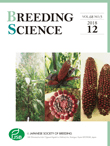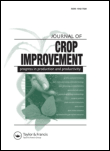
INDIAN JOURNAL OF GENETICS AND PLANT BREEDING
Scope & Guideline
Illuminating Pathways in Plant Genetics and Breeding
Introduction
Aims and Scopes
- Plant Genetic Diversity and Conservation:
Research on the genetic diversity of various crops, including traditional varieties and landraces, to ensure conservation and utilization of genetic resources. - Molecular Breeding Techniques:
Utilization of molecular markers and genomic tools to enhance breeding programs, including marker-assisted selection and genomic selection. - Genotype-Environment Interactions:
Studies focusing on how different genotypes respond to varying environmental conditions, contributing to the understanding of crop adaptability and yield stability. - Stress Tolerance Mechanisms:
Investigations into the genetic and physiological mechanisms that confer tolerance to abiotic stresses such as drought, salinity, and temperature extremes. - Trait Mapping and QTL Analysis:
Research aimed at identifying quantitative trait loci (QTL) associated with important agronomic traits to facilitate targeted breeding efforts. - Innovative Breeding Strategies:
Exploration of new breeding methodologies, including hybridization, genetic engineering, and biotechnology applications to develop superior crop varieties.
Trending and Emerging
- Genomic and Transcriptomic Approaches:
An increasing number of studies utilize genomic and transcriptomic technologies to uncover the genetic basis of traits, indicating a shift towards high-throughput methodologies. - Biotechnological Applications in Breeding:
Research exploring the application of biotechnology, including CRISPR and other gene-editing technologies, is on the rise, emphasizing the potential for rapid advancements in crop improvement. - Focus on Nutritional Quality and Functional Traits:
There is a growing interest in breeding crops for enhanced nutritional quality and health-related attributes, reflecting broader societal concerns regarding food security and health. - Climate Resilience and Sustainability:
Emerging research themes are increasingly centered on developing climate-resilient crops and sustainable agricultural practices to address the challenges posed by climate change. - Integration of Data Science in Breeding:
The integration of data science, including machine learning and big data analytics, into breeding programs is becoming more prevalent, showcasing innovative approaches to enhance decision-making in plant breeding.
Declining or Waning
- Traditional Breeding Approaches:
There seems to be a decrease in publications focusing solely on conventional breeding methods, as the field increasingly emphasizes molecular and genomic approaches. - Single Trait Analysis:
Research that focuses on the genetic analysis of single traits is becoming less common, with a shift towards multi-trait analyses and integrated approaches that consider complex interactions. - Basic Morphological Studies:
Papers concentrating solely on morphological characteristics without linking them to genetic or environmental factors are appearing less frequently, indicating a trend towards more integrative studies.
Similar Journals

Revista Fitotecnia Mexicana
Advancing Agricultural Knowledge for a Sustainable FutureRevista Fitotecnia Mexicana is a prominent academic journal published by the SOC MEXICANA FITOGENETICA, dedicated to advancing knowledge in the fields of agronomy, crop science, genetics, horticulture, and plant science. With its establishment dating back to 2007 and currently running through 2024, this journal serves as an important platform for researchers, professionals, and academic institutions interested in plant genetic resources and agricultural innovations. Although it holds a Q4 quartile ranking in various categories and is positioned within the lower percentiles in Scopus rankings, it provides crucial insights and opportunities for emerging ideas and local research initiatives. Based in Mexico, and with its indexed ISSN 0187-7380, the journal plays an important role in stemming from the rich agricultural heritage of the region. The lack of open access options underscores the depth of curated content provided, making it a valuable resource for professionals seeking to expand their expertise in the sector.

Czech Journal of Genetics and Plant Breeding
Unlocking the potential of plant genetics for global impact.Czech Journal of Genetics and Plant Breeding is a premier academic journal dedicated to advancing the fields of genetics and plant science. Published by the esteemed Czech Academy Agricultural Sciences, this journal has been available as an Open Access resource since 2002, ensuring that essential research is freely accessible to a global audience. With an ISSN of 1212-1975 and an E-ISSN of 1805-9325, it continues to disseminate high-quality studies and findings from the vibrant scientific community in the Czech Republic and beyond. The journal operates within the Scopus ranks, securing 279th place in the category of Plant Science and 282nd in Genetics, reflecting its commitment to scholarly rigor. The Journal's objectives focus on exploring innovations in genetic research and plant breeding methodologies, offering valuable insights that foster collaboration among researchers, professionals, and students alike. As the journal converges from 2007 to 2024, it remains a vital publication for those seeking to stay abreast of developments in genetic diversity, crop improvement, and sustainable agriculture practices.

CANADIAN JOURNAL OF PLANT SCIENCE
Fostering Collaboration in Plant Research ExcellenceCanadian Journal of Plant Science (ISSN: 0008-4220, E-ISSN: 1918-1833) is a prestigious publication dedicated to advancing research in the fields of agronomy, horticulture, and plant science. Published by Canadian Science Publishing, this journal has been a cornerstone in the Canadian and international scientific community since its inception in 1973. With a solid presence in reputable databases, it ranks in the Q3 category for multiple disciplines as of 2023, reflecting its impact and relevance within the agricultural sciences. The journal serves as a vital resource for researchers, professionals, and students, encouraging the dissemination of innovative findings and fostering collaboration across disciplines. Although it is not an open-access journal, subscribers gain exclusive access to a wealth of knowledge, with articles aiming to enhance the understanding of plant systems and contribute to sustainable agricultural practices. The Canadian Journal of Plant Science remains committed to supporting the growth of plant-related research and its practical applications in today's changing environmental landscape.

Rice
Pioneering research at the intersection of agriculture and science.Rice, an esteemed journal published by Springer, is at the forefront of scientific research in the fields of Agronomy, Plant Science, and Soil Science. With its ISSN 1939-8425 and E-ISSN 1939-8433, the journal offers open access since 2012, ensuring that vital research findings are widely accessible to researchers, professionals, and students globally. Based in the United States, the journal has established itself as a pivotal resource, reflected in its impressive rankings—Q1 across multiple categories in 2023, including Agronomy, Plant Science, and Soil Science. With Scopus rankings positioning it in the top tiers of agricultural and biological sciences, Rice continues to foster innovative dialogue and advances in agricultural research. The journal's objectives focus on disseminating high-quality research that contributes significantly to the understanding and sustainable management of rice production, supporting global food security and agricultural practices. Researchers in this domain will find Rice to be an invaluable resource for cutting-edge findings and collaborative opportunities.

Crop Breeding and Applied Biotechnology
Driving progress in agronomy with impactful research contributions.Crop Breeding and Applied Biotechnology is a prominent open-access journal published by the Brazilian Society of Plant Breeding that has been dedicated to advancing research in the fields of Agronomy, Crop Science, and Biotechnology since its inception in 2001. With an ISSN of 1984-7033 and an E-ISSN of 1518-7853, this journal is widely recognized within the academic community, evidenced by its Q2 ranking in Agronomy and Crop Science and Q3 ranking in Biotechnology for 2023. The journal serves as a vital platform for researchers, professionals, and students, facilitating the exchange of innovative ideas and studies in crop breeding techniques, genetic improvements, and applied biotechnological advancements. Housed at the Federal University of Viçosa, Brazil, it not only enhances global collaboration among scientists but also contributes to the sustainable development of agricultural practices. As a peer-reviewed journal with a significant indexing presence, it ensures high visibility and accessibility of quality research to the global scientific community.

Plant Gene
Exploring the Genetic Blueprint of FloraPlant Gene is an esteemed academic journal dedicated to the comprehensive study of plant genetics, genomics, and biotechnology. Published by Elsevier, this journal operates from its base in the Netherlands and has made significant strides since its inception in 2015, with a converged year span extending until 2024. As an integral resource in the field, Plant Gene is categorized in the Q2 quartile for Plant Science and Q3 for Biochemistry, Biotechnology, and Genetics as per the 2023 evaluations, reflecting its growing influence and quality of research. With an impactful presence in Scopus rankings—positioned at #145 in Plant Science—this journal serves as a platform for presenting innovative findings and advancing knowledge in plant science. Researchers, professionals, and students will find access to cutting-edge research articles that not only drive the scientific community forward but also offer invaluable insights into the genetic mechanisms underpinning plant development and resilience. While the journal currently operates under a subscription-based model, it aims to broaden accessibility and foster a diverse range of scholarly discussions in the ever-evolving field of plant genetics.

BREEDING SCIENCE
Advancing the Future of Agronomy and GeneticsBREEDING SCIENCE is a premier journal published by the Japanese Society of Breeding, dedicated to the advancement of knowledge in the disciplines of agronomy, plant science, and genetics. Established in 1993, this influential publication has consistently contributed to the global research community, showcasing high-quality studies that intersect innovative breeding techniques with pressing agricultural challenges. With an esteemed Scopus rank placing it in the top quartile of Agronomy and Crop Science and the second quartile in Plant Science, BREEDING SCIENCE is essential reading for researchers, professionals, and students alike. The journal's reach and rigor are evidenced by its significant presence in leading academic databases, providing insights and advancements that are critical for improved crop production and sustainable practices. Although it does not currently offer open access options, the depth and relevance of its content ensure that it remains a vital resource for those committed to exploring the evolution and impact of breeding science. For further information, readers are encouraged to connect directly with the journal via its administrative office located at the University of Tokyo's Graduate School of Agricultural and Life Sciences.

Agricultural Science and Practice
Exploring solutions to global agricultural challenges.Agricultural Science and Practice is a pivotal journal dedicated to advancing knowledge and research in the field of agricultural sciences. Published by the NATIONAL ACADEMY OF AGRARIAN SCIENCES OF UKRAINE, this journal serves as a vital resource for researchers, professionals, and students engaged in agriculture, agronomy, and related disciplines. The journal aims to disseminate high-quality, peer-reviewed articles that address contemporary issues, innovative practices, and advancements in agricultural methodologies. While currently specified as non-open access, the journal endeavors to contribute significantly to the global agricultural knowledge pool while fostering a collaborative research environment. With its base in Kyiv, Ukraine, Agricultural Science and Practice plays an essential role in highlighting regional agricultural challenges and solutions, thereby attracting a diverse readership that aspires to enhance food security and sustainable farming practices worldwide.

Journal of Crop Improvement
Nurturing the next generation of crop improvement strategies.The Journal of Crop Improvement, published by Taylor & Francis Inc, is an esteemed platform dedicated to advancing the field of agronomy and crop science. With an ISSN of 1542-7528 and an E-ISSN of 1542-7536, this journal boasts a commendable reputation, reflected in its 2023 quartile rankings—notably, Q2 in Agronomy and Crop Science and Q2 in Plant Science, positioning it among the leading publications within its category. The journal encompasses a wide range of topics related to crop enhancement, sustainable agriculture, and genetic advancements, catering to the needs of researchers, industry professionals, and students alike. Although it currently does not provide open access, the Journal of Crop Improvement plays a crucial role in disseminating pioneering research aimed at improving crop resilience, yield, and quality. By maintaining a focus on innovative studies and empirical findings, the journal supports the global agricultural community in addressing the challenges posed by climate change and food security.

MOLECULAR BREEDING
Unlocking the Future of Crop Resilience and GeneticsMOLECULAR BREEDING is a prestigious journal published by Springer, dedicated to advancing the field of agronomy, plant science, and biotechnology through innovative research contributions. With an impressive ISSN of 1380-3743 and E-ISSN 1572-9788, this journal has continuously served the scientific community since its inception in 1995. Operating from the Netherlands, MOLECULAR BREEDING is recognized for its high impact factor and status in the Q1 quartile for both Agronomy and Crop Science and Plant Science in the latest 2023 metrics, highlighting its influential role in these domains. With strong Scopus rankings reflecting its position within the top percentiles of various related fields—including a notable 81st percentile in Plant Science—this journal is essential for researchers, professionals, and students striving to understand and innovate in molecular genetics and breeding techniques. Although it does not provide open access, its rigorous peer-review process ensures that published articles maintain the highest standards and contribute significantly to the scientific discourse. The journal’s diverse scope encompasses significant advancements in molecular biology and genetics, ultimately supporting the global objectives of sustainable agriculture and enhanced crop resilience.